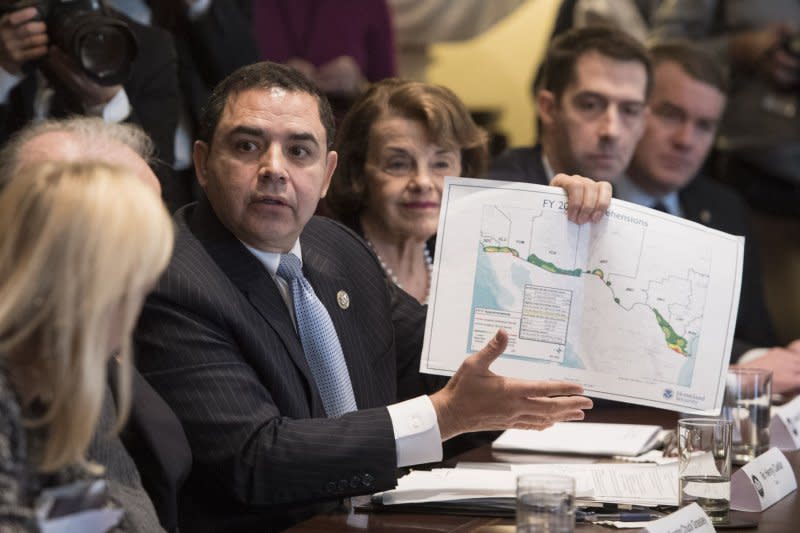Henry Cuellar launches new border security group for Democrats

- Oops!Something went wrong.Please try again later.
- Oops!Something went wrong.Please try again later.
- Oops!Something went wrong.Please try again later.
- Oops!Something went wrong.Please try again later.
- Oops!Something went wrong.Please try again later.
WASHINGTON, March 12 (UPI) -- U.S. Rep. Henry Cuellar of Texas launched a Democratic working group on border security Tuesday, hoping to counter the Republican claims that Democrats are unwilling to address the issue.
"It's important for Democrats to talk about strong border security and still be respectful of immigrants' rights," Cuellar, D-Laredo, told reporters. "For so long the Republicans have had a narrative about the border being a dangerous place and out of control. And I think it's important that Democrats also have a narrative about border security."
The Democrats for Border Security Task Force is advocating for the bipartisan border security legislation that was introduced earlier this year in the Senate but died after Republicans turned on the package. Democrats derided Republicans for killing the package because a broken border was politically expedient for former President Donald Trump in his 2024 run for the White House.
"The cynicism of saying that I don't want to pass a package that will help us address a problem because I want to run on that in November is unacceptable," U.S. Rep. Colin Allred, D-Dallas, said during the news conference
Allred and U.S. Rep. Lizzie Fletcher, D-Houston, are on the task force with Cuellar, whose district is on the border with Mexico. Cuellar is co-chair of the group and hasn't shied from working with Republicans on border issues in the past. Allred is running for U.S. Senate against Republican Sen. Ted Cruz, a border hawk who opposes the Senate border deal.

Few issues have been as persistently vexing for Democrats during Joe Biden's presidency as the border. Democrats pushed the issue off to the side at the beginning of Biden's presidency when they had control of both chambers of Congress, opting instead to focus on pandemic recovery, infrastructure and climate change.
Most discussion among Democrats on border issues at the time centered on securing permanent residency or citizenship for undocumented immigrants who had arrived as children.
But as Republicans took control of the House and border crossings reached record levels, Republicans amped the attacks against Biden as being too lenient after he rescinded many of Trump's border policies. The Border Patrol recorded over 2 million arrests in the 2022 fiscal year -- a new high. Biden did away with a Trump-era policy that required migrants to wait out their asylum claims in Mexico, which immigrant rights advocates said led to squalid and dangerous conditions.
House Republicans passed a hard-line border security package last year that would crack down on asylum eligibility. The bill was hammered out of a border plan introduced by Texas Republicans months before. Cruz introduced the Senate version of the bill, but Senate Democrats made it clear they would never support it.
The bipartisan Senate border deal would be a major legislative crackdown. It would require a shutdown of all border crossings between ports of entry if unlawful crossings exceed an average of 5,000 per day in a week or 8,500 in a single day. It would also give federal agents rather than judges greater authority to determine asylum claims at the border.
The bill also included aid for Ukraine, Israel and U.S. allies in the Pacific. Arizona independent Sen. Kyrsten Sinema, Connecticut Democrat Sen. Chris Murphy and Oklahoma Republican Sen. James Lankford negotiated the deal.
Neither side was fully satisfied with the deal. The proposal does not give migrants who came as children, commonly called Dreamers, a pathway to citizenship, which was a major Democratic priority. Nor does it end the parole program that allows the president to admit foreign nationals on a case-by-case basis, which Republicans assert Biden has abused.
Biden has used the authority to allow migrants from several Latin American countries to enter the United States on humanitarian grounds after being screened in their home countries.
Biden made an appeal to Congress to take up the border bill during a recent visit to Brownsville and during his State of the Union address. But House Republicans under Speaker Mike Johnson, R-La., made it clear they have no interest in passing the package. The speaker normally has control over when legislation makes it to the House floor.
U.S. Rep. Brian Fitzpatrick, R-Pa., is leading a procedural maneuver that could get around Johnson and force a vote on border security legislation. Fitzpatrick is an ardent supporter of aid for Ukraine, even as many members of his party turn away from the effort, and is keen to get a border and foreign package through. Pro-Ukraine Democrats would have to join in to pass the package. The move would require 218 votes.
Cuellar said he would support Fitzpatrick's effort if it came to the floor but that he was focused on passing the legislation negotiated in the Senate.
The Senate border deal also has its critics on the left who say it could complicate legitimate asylum claims and does not go far enough on giving undocumented immigrants legal status in the country.
U.S. Rep. Veronica Escobar, D-El Paso, opposes the bill and has said rapid expulsions do not work and merely lead to crowding on the Mexican side of the border, as well as repeat crossers.
"I live on the border, I have daily communication with Border Patrol, in fact, I'm bringing 10 colleagues to El Paso to show what works and what doesn't. And something that has consistently not worked is rapid expulsion," Escobar said in a recent interview with Politico. "It creates more inhumane conditions for migrants. It creates more death, more persecution, more sexual assault, just horrific conditions for migrants."
Escobar has her own bipartisan legislation she introduced last spring. She serves as a co-chair of Biden's re-election committee but has expressed dismay with Biden's recent language on the border bending toward Republican rhetoric. Biden said in January that if Congress passed the Senate deal, he would "shut down the border right now and fix it quickly."
Allred also backs Escobar's legislation, the Dignity Act, and said Tuesday that the Senate border deal was just a start. He urged colleagues to also consider other bipartisan border legislation that also tackles legal entry, as well as controlling illegal crossings "in a comprehensive way," including the Dignity Act.
Cuellar acknowledged that the Senate border deal has opponents throughout both parties, but stressed the need for border reform was high enough to push a majority of the House to pass the bill.
"We do know that in both political parties, there are some folks that don't support the whole thing," Cuellar said. "But I think somewhere in the middle, you got about 80% of Democrats and Republicans who want to get it done, and I think if they would put the Senate bill on the floor, we would get it passed."
This article originally appeared in The Texas Tribune at https://www.texastribune.org/2024/03/12/henry-cuellar-democrats-senate-border-bill/.
The Texas Tribune is a member-supported, nonpartisan newsroom informing and engaging Texans on state politics and policy. Learn more at texastribune.org.

